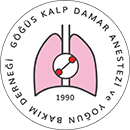

Travma hastalarında skorlama sistemlerinin yoğun bakım mortalitesi açısından değerlendirilmesi
Fatma Yıldırım, İskender Kara, Hamit Küçük, Lale Karabıyık, İsmail KatıGazi Üniversitesi Tıp Fakültesi, Anesteziyoloji Ve Reanimasyon Ana Bilim Dalı, Yoğun Bakım Bilim Dalı Ankara.GİRİŞ ve AMAÇ: Bu çalışmada, travmalı yoğun bakım hastalarında, Akut Fizyoloji ve Kronik Sağlık Değerlendirmesi (APACHE II), Ardışık Organ Yetmezliği Değerlendirme Skoru (SOFA), Glasgow Koma Skoru (GKS) ve Revize Travma Skorunun (RTS) prognozu öngörmeye katkısının retrospektif olarak karşılaştırılması amaçlandı.
YÖNTEM ve GEREÇLER: Anesteziyoloji yoğun bakım ünitesinde Ocak 2013-Ekim 2013 arasında tedavi görmüş travma hastalarının demografik verileri, travma etiyolojileri, kabul yerleri, yatış süreleri, mortaliteleri ve APACHE II, SOFA, GKS, ve RTS skorları kaydedildi. Skorlar ile yoğun bakım mortalitesi arasındaki ilişki incelendi.
BULGULAR: Çalışmaya alınan 31 hastanın (20 Erkek, 11 Kadın) median yaşı 43 [25-61] idi, 19 (61.3)u exitus, 12 (38.7)si taburcu edilmişti. Exitus olan ve taburcu edilen gruplar arasında yaş, cinsiyet, travma etiyolojileri, kabul yerleri, yatış süreleri açısından fark tespit edilmedi (p>0.05). Exitus grubundaki hastaların APACHE II skorları daha yüksekti (median 15 vs 9, p=0.035). Skorlama sistemlerinin mortaliteyi öngörmede değerini tespit etmek için yapılan ROC eğri analizine göre, eğri altındaki alan APACHE II için 0.726 (p=0.037), GKS için 0.393 (p=0.320), SOFA için 0.625 (p=0.248), RTS için 0.412 (p=0.417) olarak tespit edildi. Korelasyon katsayıları sırasıyla -0.630, 0.894, -0.545 ve 1.0 bulundu.
TARTIŞMA ve SONUÇ: Travma hastalarında APACHE II skoru mortaliteyi öngörmede daha etkili gözükmektedir.
Anahtar Kelimeler: Yoğun bakım, Travma, Skorlama sistemleri, Mortalite
Evaluation of the scoring systems in trauma patients to predict intensive care mortality
Fatma Yıldırım, İskender Kara, Hamit Küçük, Lale Karabıyık, İsmail KatıGazi University Medical School, Department Of Anesthesiology And Reanimation, Division Of Intensive Care, Ankara, TurkeyINTRODUCTION: In this study, we aimed to investigate the contribution of Acute Physiology and Chronic Health Evaluation (APACHE II), Sequential Organ Failure Assessment (SOFA), Glasgow Coma Score (GCS) and Revised Trauma Score (RTS) to predict the prognosis of trauma patients in ıntensive care unite (ICU).
METHODS: Medical records of the trauma patients that were treated in the Anesthesiology ICU between January 2013-October 2013 were retrospectively viewed. Demographic characteristics, trauma etiologies, admission sites, duration of hospitalization, mortality and APACHE II, SOFA, GCS, and RTS scores of patients were recorded. The relationship between scores and ICU mortality was examined.
RESULTS: Median age of the 31 patients (20 men, 11 women) was 43 [25-61], 19 (61.3) of them died, 12 (38.7) of them discharged from the ICU. There was no difference in terms of age, gender, etiology of trauma, admission sites, duration of hospitalization (p> 0.05) between died and discharged patients. APACHE II score of the exitus group was higher (median 15 vs 9, p = 0.035). According to the ROC curve analysis that was performed to determine the value of scoring systems to predict mortality, area under the curve for APACHE II, GCS, SOFA, RTS were 0.726 (p = 0.037), 0.393 (p = 0.320), 0.625 (p = 0.248), 0.412 (p = 0.417) respectively. Correlation coefficients were -0630, 0894, -0545 and 1.0 respectively.
DISCUSSION AND CONCLUSION: APACHE II score seems more effective to predict mortality in trauma patients in ICU.
Keywords: Intensive Care, Trauma, Scoring systems, Mortality
Makale Dili: Türkçe
(2443 kere indirildi)

















